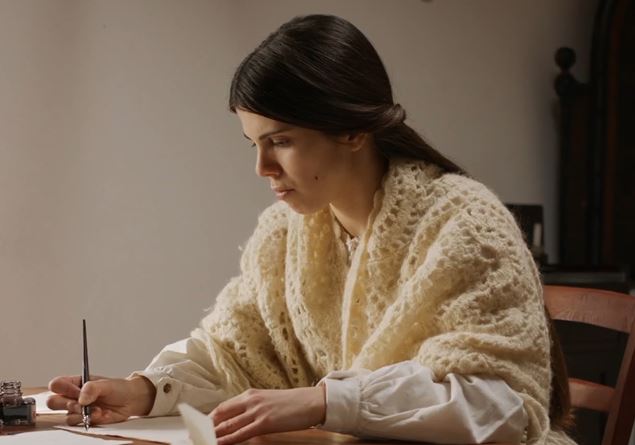A young Sardinian actress, Barbara Pitzianti, brings to the cinema the life and soul of Grazia Deledda, a Catholic writer and first and the only Italian woman to receive the Nobel Prize for literature in 1926. A biographical film that is not only a tribute to one of the greatest voices of Italian literature, but also a journey into the roots, in the faith and strength of a woman who knew how to affirm her voice in a world that did not foresee it. The film, in theaters from 9 October (first in Sardinia, then throughout Italy), is directed by Paola Columba and produced by Fabio Segatori, also co -author of the script. It is inspired by Cosimathe posthumous and unfinished autobiographical novel of Deledda. In the cast, Donatella Finocchiaro also in the role of the mother of GraziaWe met Barbara Pitzianti, interpreter of the young grace, to understand how he lived this experience and how much the work of the writer is still current for the new generations.
Barbara, her first film experience is precisely in the role of a Sardinian writer. What emotion was it?
«An immense honor. The film tells grace in the years of formation, until the departure, twenty -ninth century, for Cagliari and then Rome: before the Nobel, before the glory. It is grace before becoming Deledda. I didn’t think I was overcoming: it was my first set and I was studying acting in London. But I immediately heard that it was a strong call. I completely immersed myself in the character, in his works, in his time. I felt the responsibility to do it justice ».
Where did you shoot the movie?
«Especially in the Nuorese and Galtellì, where Deledda stayed and set Cane in the wind. The Sardinia that we tell is the ancient, intact. There was an accurate job on costumes, environments, tools, objects. I myself learned the Logudorese, the Sardinian language of the North: coming from the south I speak Campidanese and it was a real challenge. The scenes in ancient Sardinian, subtitled, return the authentic soul of that land, patriarchal and closed, but full of strength and light ».
Who was, for you, Grazia Deledda?
«A girl who dreamed of writing when women were not allowed to study. He had a third grade, but he wanted to repeat it twice to learn. It was a self -taught, driven by a faith and a desire for freedom that made it revolutionary. He married and was a mother, but did not give up writing. He wanted to live in his talent, not in the shade of a man. And the husband, in fact, left the work to follow her: an unthinkable gesture then. Pirandello, perhaps annoyed, even dedicated her a satire, her husband. But she remained faithful to her vision: writing was her vocation ».
What do you recognize more in her, as a woman and as Sardinian?
«In determination and faith. Grazia did not let himself be stopped by the judgments of the country or by the limits of her time. He transformed the pain into art, and in this faith was his secret force. She was a woman of profound spirituality: she knew that only by believing she can remain free. The film is also this: a reflection on the silent heroism of women, on the female condition and the sense of duty ».
The spiritual dimension is central in his works. How was it made in the film?
«The film is shot in subjective: the camera follows grace as if it were inside his thoughts. The voiceover, the prayers, the moments of silence show his dialogue with God, his spirituality. Faith is not told rhetorically, but as an intimate presence, constant guide in its inner struggle ».
Do you think your message can still speak to young people?
“Yes, deeply. Through his youth we tell how the family, artistic and spiritual dimension are inseparable. His faith inspired his art, his way of observing nature and men. His inner struggle, between desire and duty, is very current ».
Is there a scene that has affected it in particular?
«Yes, that of the first love. Grazia is afraid of not being enough, of being ugly, it fears the refusal. It is a universal feeling: I have recognized me because I also lived a similar experience. At that moment I felt his fragility and greatness together ».
If he lived today, what battle would he carry on?
«The one for female emancipation. Despite progress, disparities remain: in wages, in roles, in the way the woman is perceived. Grazia would have fought against feminicides, but with its measure: an ethical rebellion, never angry. He was a feminist of faith, as someone would say. Far from the most exasperated feminism of Sibilla Aleramo. And if I think of a contemporary voice that challenged the schemes, perhaps Michela Murgia was a bit the Deledda of our times ».
What did this experience left her?
“He changed me. As an artist and as a person. Paola Columba taught me listening, the measure, the truth in reciting, to modulate the voice. In short, the profession of actress. And Grace taught me the constancy, faith, the freedom to believe in one’s dreams even when it seems impossible ».
The greatest lesson that Grazia left?
«That faith and tenacity can make what seems destined to remain dreamy possible. The film is educational, also for schools. His story is a message for young people: if you really believe in something, without alternatives, then life finds its way ».


